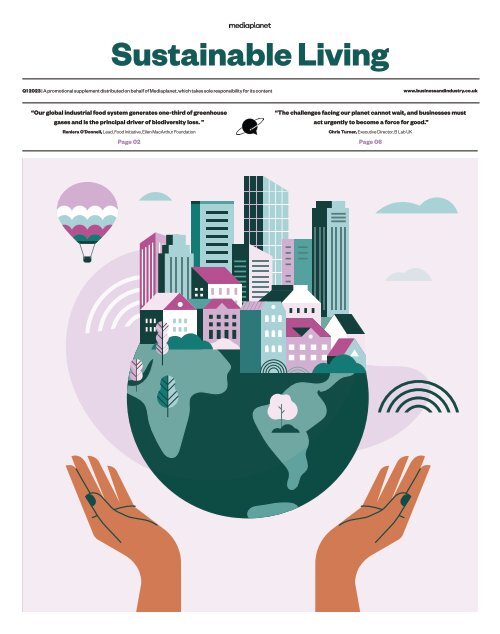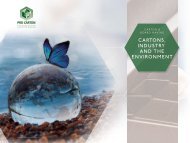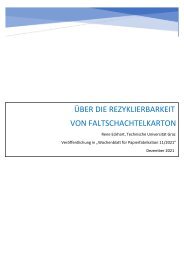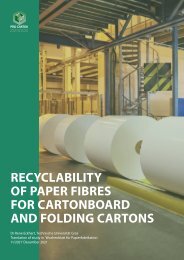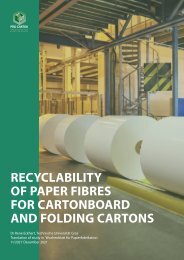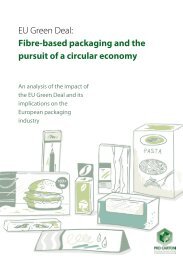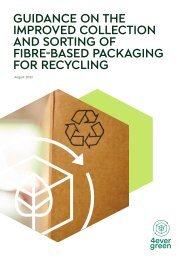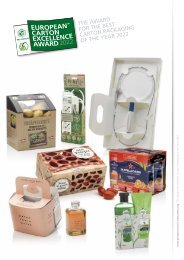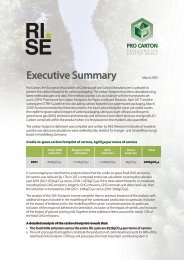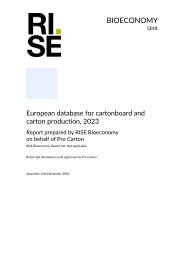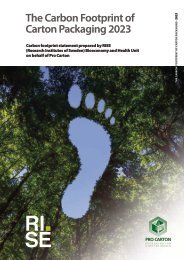2023 Sustainable Living Media Planet Supplement
Create successful ePaper yourself
Turn your PDF publications into a flip-book with our unique Google optimized e-Paper software.
<strong>Sustainable</strong> <strong>Living</strong><br />
Q1 <strong>2023</strong> | A promotional supplement distributed on behalf of <strong>Media</strong>planet, which takes sole responsibility for its content<br />
www.businessandindustry.co.uk<br />
“Our global industrial food system generates one-third of greenhouse<br />
gases and is the principal driver of biodiversity loss. ”<br />
Reniera O’Donnell, Lead, Food Initiative, Ellen MacArthur Foundation<br />
Page 02<br />
“The challenges facing our planet cannot wait, and businesses must<br />
act urgently to become a force for good.”<br />
Chris Turner, Executive Director, B Lab UK<br />
Page 06
A PROMOTIONAL SUPPLEMENT DISTRIBUTED ON BEHALF OF MEDIAPLANET, WHICH TAKES SOLE RESPONSIBILITY FOR ITS CONTENTS<br />
Redesigning our food system can allow nature to thrive<br />
A circular economy for food could safeguard production without degrading our natural resources.<br />
WRITTEN BY<br />
Reniera O’Donnell<br />
Lead, Food Initiative,<br />
Ellen MacArthur<br />
Foundation<br />
Within the hills of South Devon countryside,<br />
volunteers at Riverford’s Wash Farm have been<br />
planting 600 metres of new hedges. Once fully<br />
grown, these lines of native hawthorn, blackthorn and dog<br />
rose will act as a windbreak to protect new walnut trees and<br />
the soil.<br />
Hedgerows help to mitigate the changing climate by<br />
capturing and storing carbon — and provide a habitat<br />
for bats, birds and insects.<br />
Within the hedges, Riverford has been rethinking<br />
the way fruit and vegetables are grown. Herbicides<br />
and pesticides have disappeared in favour of boosting<br />
habitats for the small predators that will<br />
eat the insects that would eat the crops.<br />
It’s one example of a growing hunger<br />
to redesign our food system to boost<br />
yields while allowing nature to thrive.<br />
Lower impact, diverse, upcycled,<br />
regeneratively produced<br />
Plentiful diversity of animals and plants<br />
sustains our human species. Yet, our global industrial<br />
food system generates one-third of greenhouse gases<br />
and is the principal driver of biodiversity loss.<br />
However, there is a better way. The top ten food<br />
manufacturers and retailers alone influence the use of 40%<br />
of all agricultural land in the EU and UK. They can adopt a<br />
circular economy approach to the design of food.<br />
This is an actionable framework, making use of<br />
four design principles: use lower impact, diverse, and<br />
upcycled ingredients and crops, all produced in a way that<br />
regenerates the environment.<br />
One-third of food<br />
produced globally<br />
ends up being<br />
wasted.<br />
By 2030, this system could reduce farm-level greenhouse<br />
gas emissions by up to 70% and increase biodiversity on<br />
farms by around 50%.<br />
Carefully selecting and upcycling ingredients<br />
Ingredient selection choices made by product development<br />
teams (and buying decisions by retailers) can actively<br />
enable farmers to regenerate nature.<br />
They can redesign and sell food products that include<br />
more diverse ingredients — choosing those that help<br />
build soil health, such as peas and beans that can<br />
fix nitrogen in the earth — and make exciting new<br />
ingredients from by-products that are<br />
often wasted. At the same time, they<br />
can ensure these ingredients have been<br />
grown in ways that support biodiversity<br />
and keep our air and waterways clean.<br />
One-third of food produced globally<br />
ends up being wasted. Manufacturers<br />
can help by opting for upcycled<br />
ingredients often consigned to the bin.<br />
For example, Rubies in the Rubble uses ingredients<br />
to make condiments that have been rejected by other<br />
manufacturers as oddly-shaped or coloured.<br />
Food producers can make food that can help nature<br />
thrive. Action at the manufacturer level means<br />
farmers can adopt an approach to managing natural<br />
systems that keep the aims of food production and the<br />
protection of nature in harmony.<br />
@BusinessandindustryUK @<strong>Media</strong>planetUK<br />
Contact information: uk.info@mediaplanet.com or +44 (0) 203 642 0737<br />
Please recycle<br />
Project Manager: Matilda Dodwell matilda.dodwell@mediaplanet.com Senior Business Development Manager: Josie Mason Managing Director: Alex Williams Head of Business Development:<br />
Ellie McGregor | Head of Print & Design: Thomas Kent Designer: Aimee Rayment Content Editor: Angelica Hackett O’Toole | Head of Digital Operations: Harvey O’Donnell Paid <strong>Media</strong><br />
Strategist: Jonni Asfaha Social & Web Editor: Henry Phillips Digital Assistant: Carolina Galbraith Duarte | All images supplied by Gettyimages, unless otherwise specified<br />
FIND OUT MORE HERE<br />
REUTERS IMPACT<br />
LEADERSHIP SUMMIT & GLOBAL BROADCAST<br />
6-7 SEPTEMBER <strong>2023</strong>, LONDON, UK<br />
#REUTERSIMPACT<br />
@REUTERSIMPACT REUTERS IMPACT @REUTERSIMPACT<br />
02 MEDIAPLANET READ MORE AT BUSINESSANDINDUSTRY.CO.UK
A PROMOTIONAL SUPPLEMENT DISTRIBUTED ON BEHALF OF MEDIAPLANET, WHICH TAKES SOLE RESPONSIBILITY FOR ITS CONTENTS<br />
How single-use packaging will actually unlock the circular economy<br />
Science has spoken. There is no ‘one size fits all’ for all packaging requirements. Reuse is not always better just<br />
because it ‘feels’ better.<br />
WRITTEN BY<br />
Winfried Muehling<br />
Marketing &<br />
Communications<br />
Director, Pro Carton<br />
Paid for by<br />
Pro Carton and BPIF<br />
In January 2021, the European Paper Packaging<br />
Alliance (EPPA) appointed Ramboll to conduct a<br />
comparative Life Cycle Assessment (LCA) study<br />
between a paperboard single-use dishes system and<br />
equivalent multiple-use dishes in Quick Service<br />
Restaurants (QSRs). The study’s overarching conclusion<br />
was that, contrary to common perceptions, single-use<br />
packaging and tableware have lower environmental<br />
impacts than reusable packaging.<br />
Single-use versus reusable packaging<br />
The following year, another Ramboll-conducted LCAs<br />
study, commissioned by FEFCO, found that the<br />
single-use corrugated board system, compared with<br />
reusable plastic packaging, is more beneficial in 10<br />
out of 15 environmental impact categories, further<br />
dispelling the myths of the reuse vs single-use debate.<br />
We must enforce objectivity for example with<br />
independent LCA studies to realistically simulate the<br />
end-of-life impact of different packaging solutions<br />
in different usage occasions. Not to forget consistent<br />
reality checks including consumer experience and<br />
preference.<br />
Sustainability of fibre-based packaging<br />
On 2nd March, Pro Carton revealed authoritative,<br />
new research proving that the European carton and<br />
cartonboard industry has succeeded in reducing<br />
its carbon footprint by 24% since 2018. The newly<br />
measured European industry average for the carbon<br />
footprint of cartons measured 249 kgCO2e<br />
cradle-to-grave and 148 kgCO2e cradle-to-gate per<br />
tonne of carton.<br />
The staggering double-digit reduction in CO2 was<br />
achieved by improving resource efficiency during<br />
the production process. It has also been bolstered<br />
by significant investments in energy efficiency and<br />
renewable energy sources at European cartonboard<br />
mills and converting operations since 2018.<br />
What’s more, the raw materials that arrive at the mills<br />
derive from sustainably managed forests. More than<br />
90% of the wood fibres used in the European paper and<br />
board industry originate from EU woodland, of which<br />
more than 78% are sourced from sustainably managed<br />
and certified forests. Europe’s forests are growing by<br />
an area equivalent to 1,500 football pitches every day,<br />
which is attributed to sustainable forest management.<br />
Fibre-based packaging — a single-use packaging<br />
medium — is leading the way when it comes to closing<br />
the loop on the packaging circular economy. We are<br />
confident that key stakeholders, from consumers and<br />
brand owners to industry bodies and legislators, will<br />
continue to acknowledge fibre-based packaging as the<br />
present and future of sustainable packaging. We are<br />
proud to be circularity leaders, and we are proud to be<br />
single-use.<br />
WRITTEN BY<br />
Jon Clark<br />
General Manager,<br />
BPIF Cartons<br />
Find out more at<br />
procarton.com<br />
Sustainability certification is the first step on a business’s path to net zero<br />
Businesses increasingly understand that sustainability certification can drive brand value and put them on the<br />
path to net zero.<br />
INTERVIEW WITH<br />
Jonathan Withey<br />
Director of<br />
Transformation and<br />
ESG, <strong>Planet</strong> Mark<br />
WRITTEN BY<br />
Tony Greenway<br />
Paid for by<br />
<strong>Planet</strong> Mark<br />
Some companies may have thought of third-party<br />
sustainability certification as a tick box exercise:<br />
something they needed to pay lip service to society.<br />
Those days are long gone, says Jonathan Withey,<br />
Director of ESG and Transformation at <strong>Planet</strong> Mark, an<br />
organisation that quantifies and independently verifies<br />
a firm’s carbon and social value.<br />
Domino effect of sustainability<br />
Now, every forward-thinking company<br />
understands the moral and commercial<br />
imperative of sustainability certification<br />
because it demonstrates a commitment<br />
to driving change, supports bids and<br />
tenders and communicates a culture<br />
of sustainable practice to internal and<br />
external stakeholders.<br />
“The business case for sustainability certification has<br />
never been greater,” explains Withey. “First, companies<br />
want to do it because they know it’s the right thing to<br />
do. Second, there’s pressure coming from bigger players.<br />
Smaller companies that work with large corporates<br />
are being told: ‘You need to measure and reduce your<br />
carbon footprint so that we can hit our carbon reduction<br />
targets.’ Third, where there’s carbon, there’s cost — so<br />
if a business is measuring and reducing its carbon<br />
Businesses should<br />
find a certification<br />
organisation best fit<br />
for their needs.<br />
footprint, it’s also saving itself money.”<br />
Insights and solutions for decarbonisation<br />
There’s a fourth driver that is hugely important:<br />
legislation. By 2050, every UK business must be net zero<br />
by law, so companies must actively work to reduce their<br />
carbon footprint. Certification is the first step on that<br />
path.<br />
Businesses should find a certification<br />
organisation best fit for their needs<br />
and can provide insights and solutions<br />
for decarbonisation. They should be<br />
prepared to identify and gather data<br />
and evidence (found in invoices, fleet<br />
monitoring systems, travel expense<br />
reports, etc.) so that the certification<br />
organisation can discover where<br />
environmental impacts are occurring and how they can<br />
be reduced.<br />
“It can be a daunting task for any company that is<br />
being certified for the first time,” admits Withey. “But<br />
a good certification firm will be able to guide them<br />
through the process and, when they are out the other<br />
side, present them with a comprehensive, engaging and<br />
valuable report that gives them a holistic view of their<br />
social and environmental impact.”<br />
To find out more<br />
about how <strong>Planet</strong><br />
Mark can help your<br />
business on its<br />
decarbonisation<br />
journey, get in touch.<br />
Find out more<br />
planetmark.com<br />
READ MORE AT BUSINESSANDINDUSTRY.CO.UK MEDIAPLANET 03
A PROMOTIONAL SUPPLEMENT DISTRIBUTED ON BEHALF OF MEDIAPLANET, WHICH TAKES SOLE RESPONSIBILITY FOR ITS CONTENTS<br />
How can digital tech enable a circular economy?<br />
Plastics, carbon, recycling; thanks to the shift in behaviour, these days, everyone has an environmental cause<br />
that they are passionate about.<br />
WRITTEN BY<br />
Julian David<br />
CEO, techUK<br />
While there has always been an<br />
eco-conscious segment of the population,<br />
growing environmental awareness and<br />
rising costs are increasing demand for products that<br />
have been used, last longer and have been made from<br />
recycled materials — a concept called ‘the circular<br />
economy.’<br />
Maximising product use<br />
Products with a longer life, lower environmental<br />
footprint and lower costs are in demand, and digital<br />
tech is going to be a huge part of the transition.<br />
One key role of tech is connecting buyers and sellers.<br />
They may not be described as ‘circular,’ but platforms<br />
like Gumtree, eBay, Facebook Marketplace and other<br />
websites are an important first step in extending<br />
product lifetimes and increasing access for people on<br />
lower incomes.<br />
This is further demonstrated by platforms such as<br />
Vinted, MusicMagpie, Nextdoor and Freecycle. There’s<br />
a huge market out there. However, quantifying it in<br />
terms of money saved compared to new items sold is<br />
difficult at present. We believe that there are many<br />
digital tools which could make this easier.<br />
Lowering product costs<br />
Tech is helping manufacturers and retailers make<br />
products more recyclable, durable and repairable to<br />
begin with.<br />
A big barrier has been getting a reliable source of<br />
recycled materials to make new products with —<br />
which is why we’re excited to see all the innovations in<br />
electronic waste tracking, so buyers and environmental<br />
law enforcers know exactly what is where, which will<br />
unearth thousands of tonnes of material for recycling<br />
and lower the price, too.<br />
Product life span<br />
Keeping things working for longer is a key part of the<br />
circular economy. If an item can be diagnosed with a<br />
fault and rectified, repair is cheaper and more likely to<br />
succeed.<br />
Vodafone developed a chip that is inserted into an<br />
appliance and can identify and notify a customer that<br />
something isn’t quite right with their appliance and<br />
suggest potential causes — and can even turn a device<br />
off if there’s a safety critical fault or if the manufacturer<br />
issues a product recall.<br />
Tech has a role in delivering the circular economy.<br />
Much of it is happening in response to consumer and<br />
cost pressure, which is a welcome change in the way<br />
we live and operate — but there needs to be a more<br />
concerted look at how tech can make a real difference.<br />
How UK savers can reassess their investments to better align with their values<br />
Consumers in the UK have begun to look more closely at where their investments are going and what impact<br />
their money is having.<br />
WRITTEN BY<br />
James Alexander<br />
Chief Executive,<br />
UKSIF<br />
In August last year, Ipsos MORI asked voters to identify<br />
the most important issue facing Britain, and 23% of<br />
respondents said pollution and the environment. UK<br />
consumers have begun to look more closely at where their<br />
investments are going and what impact their money is<br />
having. We believe sustainability allows for long-term<br />
investment which can achieve strong financial<br />
returns while promoting long-term environmental<br />
and social value.<br />
‘Greenwashing’ risks in investing<br />
The finance sector has long been<br />
engaged in sustainable and responsible<br />
investing; in particular, the integration<br />
of environmental, social and<br />
governance (ESG) factors in investment<br />
processes. These factors cover the<br />
natural environment and climate<br />
but also consider wider social issues,<br />
such as human rights and working<br />
conditions.<br />
When investing sustainably, consider the potential<br />
risks of ‘greenwashing’ in the investment market. This<br />
is when an investment firm — or its products — makes<br />
environmentally or socially sustainable claims, without<br />
necessarily implementing the sustainability strategies and<br />
actions that can meet these claims. Even good intentions<br />
can sometimes fail to meet consumers’ or their funds’<br />
objectives.<br />
Even good intentions<br />
can sometimes fail<br />
to meet consumers’<br />
or their funds’<br />
objectives.<br />
Navigating through the sustainable investing market<br />
Important things to look for when choosing a<br />
sustainable investment product include a company or<br />
funds’ claims and delving into their explanations of<br />
how they intend to achieve these.<br />
Consumers can also look at how their funds are investing<br />
in climate solutions and the evidence of their positive<br />
impacts on society and the environment — beyond just<br />
mitigating risks alone.<br />
Upcoming sustainable investment<br />
requirements<br />
The UK’s financial regulator —<br />
the Financial Conduct Authority —<br />
is in the process of helping give<br />
consumers greater confidence in<br />
the sustainable investing market by<br />
creating new ‘Sustainability Disclosure<br />
Requirements’ and investment labels.<br />
It recognises different approaches<br />
to sustainable investing and positively covers both<br />
environmental and social issues. These requirements<br />
could allow consumers to make better-informed<br />
decisions and reduce the risks of ‘greenwashing’<br />
and are a key development to look out for in the<br />
coming months.<br />
04 MEDIAPLANET READ MORE AT BUSINESSANDINDUSTRY.CO.UK
A PROMOTIONAL SUPPLEMENT DISTRIBUTED ON BEHALF OF MEDIAPLANET, WHICH TAKES SOLE RESPONSIBILITY FOR ITS CONTENTS<br />
Why impact<br />
investing can be a<br />
financial win — and<br />
the right thing to do<br />
Impact investing is a way to flow capital towards underserved<br />
environmental and social issues, says Ben Constable-Maxwell,<br />
Head of Impact Investing, M&G.<br />
INTERVIEW WITH<br />
Ben Constable-<br />
Maxwell,<br />
Head of Impact<br />
Investing, M&G<br />
WRITTEN BY<br />
Tony Greenway<br />
Paid for by M&G<br />
How is impact investing different from other types of<br />
sustainable and responsible investing?<br />
<strong>Sustainable</strong> and responsible investors primarily<br />
seek good financial returns, but they also<br />
avoid ‘bad actors’ or invest in companies<br />
that successfully manage their social and<br />
environmental responsibilities. Impact investors,<br />
meanwhile, take a different approach by<br />
intentionally targeting specific environmental<br />
and social challenges and invest in companies or<br />
solutions that are trying to actively drive positive<br />
change in those areas.<br />
These types of investors want solid financial<br />
returns too; but crucially, they also want their<br />
investment to do good, not just avoid harm.<br />
Evaluating and measuring the positive impacts<br />
is a necessary part of the process — and helps<br />
to avoid ‘impact washing.’ Importantly, impact<br />
investing has a role to play in orienting capital<br />
towards issues and communities that are<br />
currently being underserved by traditional<br />
finance.<br />
What are the biggest challenges facing sustainable and<br />
impact investors?<br />
The Global Impact Investing Network (GIIN) reports<br />
that the worldwide impact investing market is now<br />
worth $1.16 trillion. That’s encouraging but, clearly,<br />
growing that market further could be a challenge<br />
in the short-term in an environment where certain<br />
high-emitting sectors are on a resurgent path.<br />
There’s also the challenge of greenwashing and<br />
impact washing: i.e., investors must make sure<br />
that the businesses they invest in aren’t making<br />
false, misleading or overstated claims about their<br />
environmental, social and governance (ESG)<br />
strategies or the sustainable impacts of their<br />
products or services.<br />
UK and European regulation in this area is<br />
welcome because it pushes businesses to be<br />
transparent about their operations and solutions.<br />
However, the right balance needs to be struck.<br />
If regulators set excessively narrow parameters<br />
about what is a sustainable or impact investment<br />
and what isn’t, it could put off potential investors<br />
and slow the market’s momentum.<br />
Is the world on track to meet the SDGs by the target date<br />
of 2030 and what can investors do to support the UN’s<br />
agenda?<br />
In 2015, the UN unveiled 17 <strong>Sustainable</strong><br />
Development Goals (SDGs) for a better and more<br />
sustainable future for all. Analyses suggest that the<br />
world is not on track to meet those 17 SDGs.<br />
In 2022, we highlighted that only two SDGs have<br />
progressed (SDG 3: good health and wellbeing, and<br />
SDG 9: industry, innovation and infrastructure);<br />
and two others (SDG 7: affordable and clean<br />
energy, and SDG 10: reduced inequalities) have<br />
gone backwards since the Covid-19 pandemic.<br />
To be fair, there’s a lot of investment going<br />
into affordable and clean energy at the moment;<br />
but much more is needed. To properly tackle<br />
the challenges we face to ensure a sustainable<br />
and equitable future, the world needs to reorient<br />
towards the SDGs and use them as a ‘north star.’<br />
As for investors, they have a huge societal<br />
responsibility — but also a huge investment<br />
opportunity — to invest their capital in companies<br />
and solutions that will solve the world’s problems.<br />
What are the most interesting opportunities ahead for<br />
impact-oriented investors?<br />
The circular economy is an area that can support<br />
solutions to some of the world’s most intractable<br />
problems. That is, investing in innovative<br />
companies that can slash the use of virgin raw<br />
materials by helping to extend the life of a<br />
product for as long as possible; or that extract<br />
products of value from waste streams before<br />
returning them as a recycled input into the<br />
industrial process.<br />
In sustainable investing, there is — naturally —<br />
a lot of focus on the climate crisis. But nature is in<br />
crisis too, and some investors are moving towards<br />
addressing this critical issue. An impact-oriented<br />
approach could include financing sustainable<br />
forestry and natural flood defences or investing in<br />
agri-tech to promote more resilient and efficient<br />
agricultural practices.<br />
All of the above can help the world achieve its<br />
sustainability goals while aiming at generating a<br />
return for investors.<br />
Scan the QR code<br />
to find out more<br />
READ MORE AT BUSINESSANDINDUSTRY.CO.UK MEDIAPLANET 05
A PROMOTIONAL SUPPLEMENT DISTRIBUTED ON BEHALF OF MEDIAPLANET, WHICH TAKES SOLE RESPONSIBILITY FOR ITS CONTENTS<br />
Embrace reuse consumption for modern<br />
times and reduce plastic pollution<br />
The proliferation of plastic pollution is harming our planet, people and economies.<br />
Half of global plastic production is for single-use; and in a business-as-usual<br />
scenario, there will be more plastic than fish in the world’s oceans by 2050.<br />
WRITTEN BY<br />
Sheila<br />
Aggarwal-Khan<br />
Director, Industry and<br />
Economy Division,<br />
UNEP<br />
WRITTEN BY<br />
Zara Ingilizian<br />
Head of Consumer<br />
Industries and<br />
the Future of<br />
Consumption<br />
Platform, World<br />
Economic Forum<br />
Currently, 14% of plastics<br />
globally are collected for<br />
recycling, with only 2%<br />
considered closed-loop recycling.<br />
According to a survey from Ipsos,<br />
three-quarters of people worldwide<br />
believe that single-use plastic<br />
products should be banned.<br />
How to reduce plastic waste<br />
Recycling alone will not solve<br />
the plastic pollution crisis. Reuse<br />
systems, in which consumer<br />
packaged goods are designed to<br />
be used multiple times before<br />
eventually exiting the stream of<br />
commerce, need to be adapted to<br />
modern ways of life.<br />
Reuse needs to become the more<br />
desirable, convenient and affordable<br />
option for consumers. And these<br />
reusables must also be designed<br />
to be recyclable. By shifting 10%<br />
of plastic products to reusable<br />
systems, the equivalent of half of<br />
annual plastic ocean waste can be<br />
prevented.<br />
Companies setting an example<br />
Algramo, a Chilean reuse startup,<br />
already operates in over 2,000<br />
family-owned stores. Its refill-onthe-go<br />
system in Santiago has proven<br />
successful even during the Covid-19<br />
lockdown: sales increased by 356%<br />
between April and June 2020.<br />
Unilever is partnering with<br />
Algramo on a mobile dispensing<br />
system that offers refillable products<br />
to consumers, and it is working<br />
with Indonesian packaging-free<br />
store Saruga to launch refill stations<br />
for their home and personal care<br />
brands.<br />
Role of consumers, businesses<br />
and governments<br />
While businesses and governments<br />
control the design of the system<br />
and safety standards, ultimately<br />
the consumer — as the end user of<br />
the packaging — can accelerate the<br />
interest for businesses to innovate<br />
on reusable design.<br />
At the Climate Conference in<br />
Glasgow in 2021, India announced<br />
a new campaign ‘Lifestyles for<br />
Environment (LiFE).’ LiFE is<br />
coming front and centre as a key<br />
issue — putting lifestyles and<br />
demand-side changes at the top of<br />
the agenda.<br />
The World Economic Forum’s<br />
‘Consumers Beyond Waste’<br />
initiative convenes leading<br />
organisations across business,<br />
civil society and government to<br />
support reuse systems fit for the<br />
modern day. Meanwhile, United<br />
Nations member states will meet<br />
in Paris at the end of May to further<br />
work to develop an international<br />
agreement on plastic pollution.<br />
Support the businesses<br />
that have been going<br />
beyond this month<br />
The UK has one of the fastest-growing<br />
communities of sustainable businesses in the<br />
world, with over 1,200 companies now certified<br />
as meeting high standards of social and<br />
environmental performance.<br />
WRITTEN BY<br />
Chris Turner<br />
Executive Director,<br />
B Lab UK<br />
It can feel disheartening to be<br />
an environmentally or socially<br />
conscious consumer right<br />
now. Despite many products<br />
and brands making sustainable<br />
claims, it’s not always easy to find<br />
companies that have made an<br />
authentic commitment to people<br />
and the planet. Our latest research<br />
has found that the vast majority of<br />
UK customers (80%) favour buying<br />
from ‘good’ companies but just one<br />
in five (22%) say it’s easy to seek<br />
them out.<br />
Businesses with high standards<br />
Certified B Corps are companies<br />
that are modelling how business<br />
should be done. They have made<br />
a legal commitment to consider<br />
people and the planet alongside<br />
profit in their decision-making —<br />
something 72% of the public agrees<br />
should be the norm for business.<br />
Alongside this legal change,<br />
they commit to high standards<br />
of environmental and social<br />
performance as a business<br />
and to being transparent and<br />
accountable for their positive<br />
impact. This means they measure<br />
their impact on customers,<br />
workers, communities and the<br />
environment. Knowing that no<br />
business is perfect, they commit<br />
to continuously improving to help<br />
us move towards the economy we<br />
need.<br />
Know who to support<br />
B Corps exist in every sector of our<br />
economy, from clothing brands like<br />
Finisterre, Chloé and Patagonia<br />
to food and drink businesses such<br />
as DASH Water, Lucky Saint and<br />
Tony’s Chocolonely. Businesses<br />
certified so far in <strong>2023</strong> include<br />
beauty brands Elemis and Wild and<br />
phone company GiffGaff.<br />
March was B Corp Month, the<br />
annual celebration of what it means<br />
to be part of a growing community<br />
of sustainable businesses. The<br />
theme for <strong>2023</strong> is We Go Beyond,<br />
with businesses demonstrating<br />
how they’re going beyond<br />
expectations to reinvent the way<br />
business is done. Look out for<br />
certified businesses shouting about<br />
the impact they’re making and<br />
encouraging others to<br />
do more.<br />
The challenges facing our planet<br />
cannot wait, and businesses must<br />
act urgently to become a force for<br />
good. For the rest of us, seeking out<br />
those who are already moving in<br />
the right direction is a small change<br />
we can make — with a big impact.<br />
Scan the QR<br />
code to find<br />
out more<br />
06 MEDIAPLANET READ MORE AT BUSINESSANDINDUSTRY.CO.UK
A PROMOTIONAL SUPPLEMENT DISTRIBUTED ON BEHALF OF MEDIAPLANET, WHICH TAKES SOLE RESPONSIBILITY FOR ITS CONTENTS<br />
Keeping things<br />
working for longer<br />
is a key part of the<br />
circular economy.<br />
~Julian David, CEO, techUK<br />
READ MORE AT BUSINESSANDINDUSTRY.CO.UK MEDIAPLANET 07
A PROMOTIONAL SUPPLEMENT DISTRIBUTED ON BEHALF OF MEDIAPLANET, WHICH TAKES SOLE RESPONSIBILITY FOR ITS CONTENTS<br />
Clearing the air<br />
on environmental<br />
claims: what to look for<br />
and what to avoid<br />
As consumers become more conscious of their carbon footprint, it’s<br />
important to understand the terms, claims and labels that will help us<br />
purchase from brands taking genuine climate action.<br />
WRITTEN BY<br />
Natalie Morris<br />
Global <strong>Media</strong> and<br />
Communications Lead,<br />
the Carbon Trust<br />
With input from<br />
colleagues Madeleine<br />
Bertie & Tirza Kreuwel<br />
According to a consumer survey<br />
undertaken by YouGov* in the US and<br />
Europe, two out of three consumers<br />
are more positive about brands that<br />
take concrete steps to reduce their<br />
products’ carbon emissions. At the same time,<br />
two-thirds think product footprint labelling is<br />
a good idea. But what exactly should consumers<br />
be looking for?<br />
Understanding environmental terms and claims<br />
As a starting point, it’s helpful to have clarity on<br />
environmental terms used in claims, which can<br />
often be confusing. Here are some key terms<br />
to know.<br />
• Greenhouse gas emissions – Gases in our<br />
atmosphere that trap heat. CO2 is the primary<br />
greenhouse gas emitted through human activities.<br />
shows consumers if a product’s carbon footprint<br />
is reducing year-on-year, is carbon neutral or<br />
lower than other market-dominant products.<br />
It also assures a third party has verified that<br />
the product’s carbon footprint is measured to<br />
internationally recognised standards.<br />
To identify genuine environmental claims,<br />
look for specific, factual information backed by<br />
credible, evidence-based data sources. Claims<br />
should be easy to understand, providing access to<br />
further information via weblinks or QR codes.<br />
Be wary of brands that claim to be ‘the first’ or<br />
saving the planet, as every product and service<br />
has an environmental impact across its lifecycle.<br />
Instead, look for brands that are transparent and<br />
share their progress on what they have achieved<br />
and what they are still working on.<br />
Paid for by the Carbon Trust<br />
• Carbon footprint – Measures the total greenhouse<br />
gas emissions caused directly and indirectly by<br />
a person, organisation, service or product.<br />
• Carbon footprint label – An on-pack label on<br />
a product demonstrating the brand is working<br />
to measure and/or reduce emissions of the<br />
given product.<br />
• Carbon neutrality – Is defined by an<br />
internationally recognised standard (PAS<br />
2060) which requires companies to reduce<br />
their emissions; any remaining emissions are<br />
compensated through offsets.<br />
• Carbon offsetting – A carbon offset allows<br />
organisations to compensate for emissions they<br />
could not reduce by funding a project with an<br />
equivalent carbon saving elsewhere.<br />
What to look for and what claims to believe<br />
When shopping, the first thing to look for is<br />
a symbol, trust or quality mark awarded by<br />
an independent third party. Carbon footprint<br />
labels on a product or its packaging show when<br />
a brand is working to measure and reduce its<br />
carbon emissions. The more we understand a<br />
product’s carbon footprint, the better choices we<br />
can make. The Carbon Trust label, for example,<br />
What to avoid<br />
As consumers are seeking more sustainable<br />
products, companies are incentivised to make<br />
their products as attractive as possible through<br />
their environmental claims. This has given rise<br />
to greenwashing where companies claim they are<br />
doing more for the environment than they are.<br />
Signs of greenwashing include:<br />
• Vague and unclear language.<br />
• Statements that give the impression a product<br />
has no negative impact at all.<br />
• Lack of accessible, adequate explanations<br />
or evidence.<br />
• Eco logos and labels that are not associated<br />
with third-party assurance to international<br />
standards.<br />
• Omitting information to appear more<br />
eco-friendly.<br />
As a consumer, if you have any concerns or<br />
doubts about a green claim, err on the side of<br />
caution. We can’t solve the climate crisis alone.<br />
But if we start to become more climate-conscious<br />
during our everyday shopping, we can reduce our<br />
footprint — one foot at a time.<br />
*Source: Product carbon footprint labelling consumer research 2020,<br />
the Carbon Trust<br />
Find out more at<br />
carbontrust.com<br />
08 MEDIAPLANET READ MORE AT BUSINESSANDINDUSTRY.CO.UK


